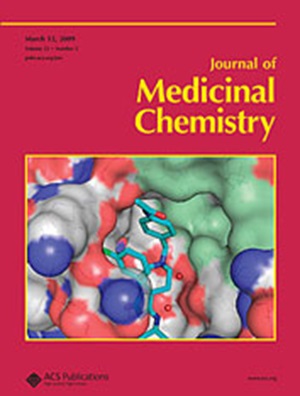Discovery of a Highly Potent and Selective Tyrosine Kinase 2 (TYK2) Degrader with In Vivo Therapeutic Efficacy in a Murine Psoriasis Model
IF 6.8
1区 医学
Q1 CHEMISTRY, MEDICINAL
引用次数: 0
Abstract
Tyrosine kinase 2 (TYK2), a critical scaffolding kinase required for type I interferon, IL-12 and IL-23 cytokine signaling, represents a compelling therapeutic target for various autoimmune diseases. However, existing TYK2 inhibitors only modulate its kinase activity. Here, we report the development of a first series of CRBN-recruiting TYK2 PROTACs based on an allosteric TYK2 inhibitor. Optimization of the potency and metabolic stability identified 15t as an exceptionally potent and selective TYK2 degrader with a DC50 value of 0.42 nM and a Dmax value of 95%, which potently and selectively blocked TYK2-dependent signaling. Importantly, 15t was active in vivo and significantly suppressed TYK2-mediated pathology in a murine psoriasis model without apparent toxicity. Collectively, our study provides a potentially valuable chemical knockdown probe for subtype-selective TYK2 degradation and further understanding TYK2 scaffolding biology, demonstrating the therapeutic potential of TYK2 PROTACs in immuno-inflammatory diseases such as psoriasis.

一种高效选择性酪氨酸激酶2 (TYK2)降解剂在小鼠牛皮癣模型中的体内治疗效果的发现
酪氨酸激酶2 (TYK2)是I型干扰素、IL-12和IL-23细胞因子信号传导所需的关键支架激酶,是各种自身免疫性疾病的一个引人注目的治疗靶点。然而,现有的TYK2抑制剂仅调节其激酶活性。在这里,我们报告了基于变构TYK2抑制剂的第一个crbn募集TYK2 PROTACs系列的开发。效价和代谢稳定性的优化表明,15t是一种非常有效和选择性的TYK2降解物,其DC50值为0.42 nM, Dmax值为95%,可有效和选择性地阻断TYK2依赖性信号。重要的是,15t在体内有活性,并在小鼠牛皮癣模型中显著抑制tyk2介导的病理,而没有明显的毒性。总之,我们的研究为亚型选择性TYK2降解提供了一个潜在有价值的化学敲低探针,并进一步了解TYK2支架生物学,证明了TYK2 PROTACs在牛皮癣等免疫炎症性疾病中的治疗潜力。
本文章由计算机程序翻译,如有差异,请以英文原文为准。
求助全文
约1分钟内获得全文
求助全文
来源期刊

Journal of Medicinal Chemistry
医学-医药化学
CiteScore
4.00
自引率
11.00%
发文量
804
审稿时长
1.9 months
期刊介绍:
The Journal of Medicinal Chemistry is a prestigious biweekly peer-reviewed publication that focuses on the multifaceted field of medicinal chemistry. Since its inception in 1959 as the Journal of Medicinal and Pharmaceutical Chemistry, it has evolved to become a cornerstone in the dissemination of research findings related to the design, synthesis, and development of therapeutic agents.
The Journal of Medicinal Chemistry is recognized for its significant impact in the scientific community, as evidenced by its 2022 impact factor of 7.3. This metric reflects the journal's influence and the importance of its content in shaping the future of drug discovery and development. The journal serves as a vital resource for chemists, pharmacologists, and other researchers interested in the molecular mechanisms of drug action and the optimization of therapeutic compounds.
 求助内容:
求助内容: 应助结果提醒方式:
应助结果提醒方式:


